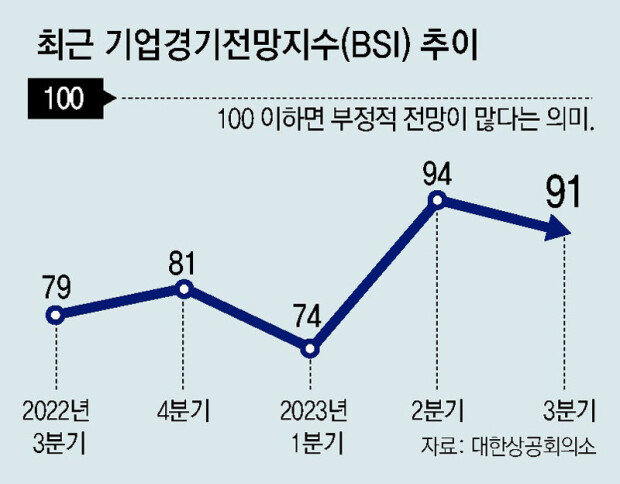Economic recovery slows down and food prices show fluctuations
Economic recovery slows down and food prices show fluctuations
Posted June. 28, 2023 07:59,
Updated June. 28, 2023 07:59

There are currently no visible indications of economic improvement as the year enters the second half. The initial outlook was that the economy would rebound in the latter half of the year, but that positive outlook has waned, at least according to the on-the-ground sentiment. There is an anticipation that prices will continue to increase until the end of the year, causing growing concern for the government.
On Tuesday, the Korea Chamber of Commerce and Industry (KCCI) reported that the Business Survey Index for the third quarter, which was conducted among 2,307 manufacturing companies across the country, recorded a value of 91, a decrease of three points compared to the previous quarter. The BSI above 100 indicates a positive outlook compared to the preceding quarter, whereas the BSI below 100 indicates the opposite. The strong optimism observed in the second quarter seems to be diminishing as the year enters the second half.
The BSI witnessed notable reductions in both the domestic economy (from 94 to 90) and exports (from 97 to 94). Specific industries such as IT, home appliances, electricity, and steel registered BSI figures well below the baseline, with values of 83, 83, 86, and 85, respectively. The auto and cosmetic industries also showed a pessimistic outlook, which contradicts the predictions of major institutions that anticipated economic recovery to begin from these key sectors.
The economic authority is deeply concerned, as lowering interest rates seems to be not feasible due to the projected inflation rate remaining above the Bank of Korea’s target of 2 percent, and there is insufficient funding available.
Anticipations of El Nino this summer in seven years have raised concerns about price volatility. In addition to the impact of the war in Ukraine, abnormal weather patterns are expected to disrupt the supply chains of food and commodities, leading to a reversal in the recent deceleration of consumer prices. There are already indications of price fluctuations, such as the rise in sugar prices, especially in food.
There is an insufficient amount of government funds available to support economic recovery. The national tax revenue from January to April 2023 amounted to 134 trillion won, representing a year-on-year decrease of 33.9 trillion won. The national debt has surpassed 1,000 trillion won for the first time in history, raising concerns about the country’s financial stability. To address this concern, the government is expected to develop economic strategies with a focus on the revival of exports and investments, aiming to strengthen economic revitalization led by the private sector.
Do-Young Kwak now@donga.com · Hee-Chang Park ramblas@donga.com







